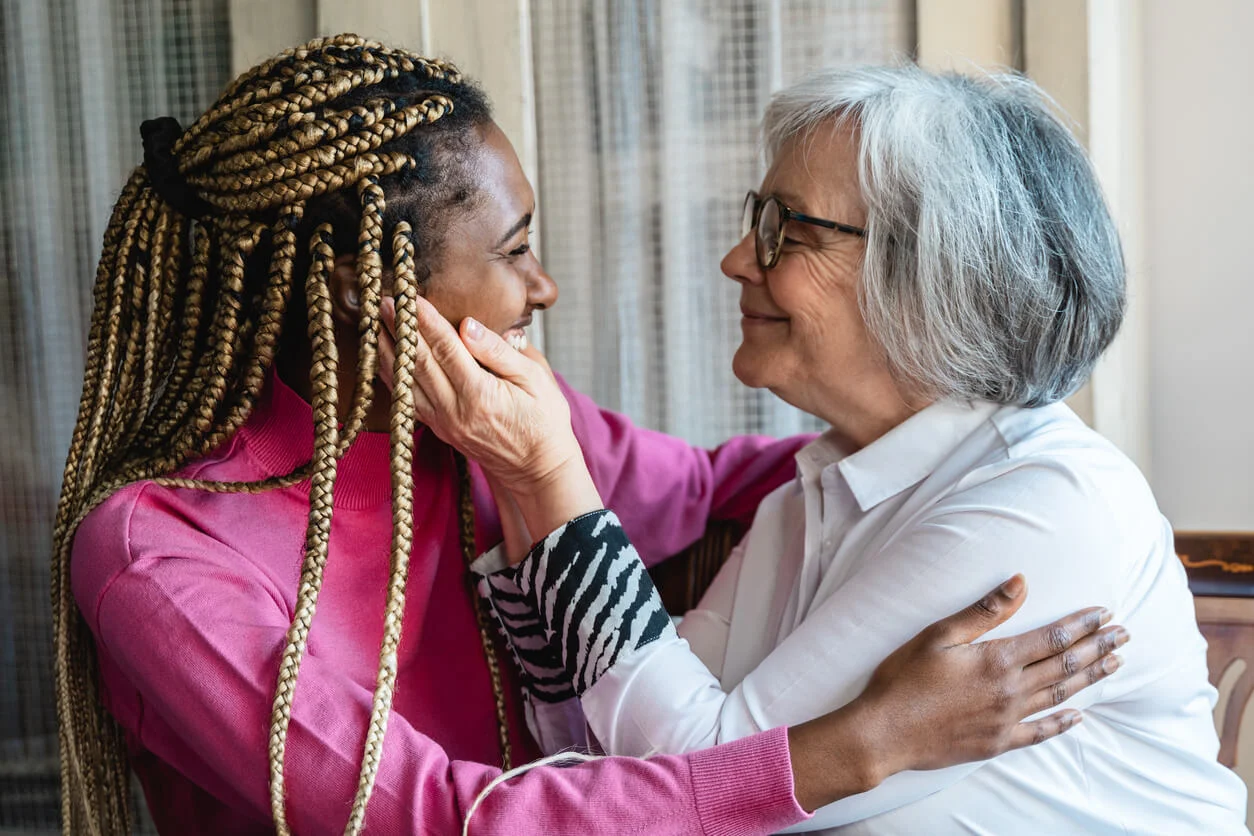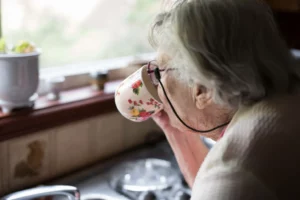What are the signs of dementia in women?
Tags
Dementia Care
Did you know women have a greater risk of developing dementia over their lifetime than men? 600,000+ women in the UK are currently living with dementia, and twice as many women are living with Alzheimer’s disease – the most common type of dementia – compared to men.
We’ve looked at why it’s more common for women, the early signs, and what’s being done to understand and care for it.
Why do women get dementia more than men?
While there are many factors for dementia risk that experts continue to research, when it comes to gender difference, there are a few common theories which may help to explain why the incidence of dementia is higher in women.
The number one factor for dementia is age. Excluding young onset dementia, the age of onset for the most common types of dementia is 65+ years old.
While the ageing process itself doesn’t cause dementia, as people age the risk of developing dementia does increase. According to the Alzheimer’s Society the risk of developing the condition roughly doubles every five years once you’ve entered your late sixties. On average women live longer than men, and are therefore more at risk.
In 2023, there were just over twice as many females than males aged 90 years and over in the UK. In England and Wales, the average life expectancy of a woman is around 83 years old. For men, it’s around 79 years old.
In addition to this, experts know from scanning the brains of people with dementia that brain cells naturally die faster in women than they do in men. This could increase the prevalence of dementia, and how quickly cognitive function is impacted.
The development of dementia in women: the numbers
According to Alzheimer's research UK, 65% of people living with dementia in the UK are women, and it's the leading cause of death for women.
Dementia disproportionately impacts women, even if they haven't been diagnosed too. 60 -70% of carers for people with dementia are women, and are 2.3 times more likely to provide care to someone for 5+ years.
Research also suggests that the female hormone oestrogen may play a part in the increased risk of dementia too.
While widely known as a sex hormone, Oestrogen isn’t only used in the body’s reproductive functions. It’s also used in our brains, specifically in the hippocampus and the prefrontal cortex, which are the areas responsible for memory and decision making, and are commonly damaged by dementia.
Oestrogen helps brain cells communicate more effectively through a process called ‘synaptic plasticity’. In short, the hormone helps the gaps between cells (synapses) adapt and send messages between the most active brain cells – so that information can be processed faster.
While women have more oestrogen, both men and women have this hormone in their bodies.
When women go through menopause their oestrogen levels significantly drop. Meanwhile, men’s brain cells actually convert the male sex hormone Testosterone into oestrogen, and therefore they are able to maintain healthy levels of oestrogen in their brains for the majority of their lives. It’s therefore believed that adequate levels of oestrogen are essential for brain health and the prevention of dementia.
Finally, exposure to certain environmental factors may increase someone’s risk of developing dementia, however this risk hasn’t been found to be exclusive to women. For example, exposure to air pollution, a lack of vitamin D, or living in a rural or deprived area with little opportunity for social activities are all believed to be related in some way to the incidence of dementia in the UK.
Is dementia genetic?
Research suggests so. Nearly two thirds of people diagnosed with Alzheimer's have at least one copy of the APOE e4 gene. While women are just as likely to have the APOE e4 gene variant it seems to increase dementia risk in women and scientists aren't quite sure why yet.
How does gender difference in dementia impact daily life or treatment?
Firstly, it’s important to understand that the symptoms of dementia differ from person to person.
Memory loss or a noticeable decline in memory is the most common symptom, however it may not be the first thing people experience, and people may experience it in different ways. For example, some may struggle with remembering names and words, while others may find it hard to keep track of tasks as they’re doing them.
Not everyone will behave the same either. Dementia is a broad term and there are many different forms. Each form of dementia comes with its own set of symptoms, and will progress in different ways. For example, Alzheimer’s disease is the most common, and is most likely to impact memory, recall and decision making.
Meanwhile, Lewy body dementia is more often associated with hallucinations, and problems with movement, such as tremors or stiffness in the arms ands legs.
Because there is such a variation, many studies are needed to understand more about each type of dementia, and crucially, how to treat them.
Unfortunately research can sometimes raise more questions than answers, particularly when it comes to the difference between the male and female dementia experience.
In 2014 the Joseph Rowntree Foundation published the ‘Dementia through a woman’s eyes’ project. It highlighted that historically, there has been a limited research and clinical trials focused on women only. In fact, the project explained that in one review, only 22 of 133 research papers related directly to women and dementia.
This is a problem for a number of reasons. With fewer female only studies, the less we know about why women more likely to develop a form of dementia. It also means that we don’t know enough to explore whether there is a more effective treatment for women, or how women-only services could help manage dementia in everyday life.
What are the very early signs of dementia in a woman?
It’s important to remember that a sign of dementia in one person, may not be present in another, as each experience of the condition can be very different.
Therefore while the below may be early warning signs, it’s crucial to seek support from a doctor if you’re worried about your own or a loved one’s cognitive health. If dementia is present, a timely diagnosis can help you get the right support and better manage symptoms.
Diagnosing dementia in women
Some research suggests that there may be benefits in using a different test to diagnose dementia in women. This is because women tend to have a stronger verbal memory than men, and therefore may do better in memory tests even if they're in the early stages of dementia, which may lead to women being under-diagnosed.
The most common cause of dementia is Alzheimer’s disease. Early symptoms of Alzheimer’s include:
- Changes to your memory
- Difficulty concentrating during conversations or daily activities
- Finding familiar tasks tricky, such as getting confused about the order you should do things
- Struggling to think of the right word in conversation
- Changes to your mood
Vascular dementia, is a common form caused by a loss of blood flow to the brain. It’s likely to have a bigger impact on your thinking and problem-solving ability.
Early signs of vascular dementia can include:
- Slower thoughts
- Difficulties making plans
- Getting lost easily, even in familiar locations
- Confusion about time
Frontotemporal dementia is far less common. It causes problems with language abilities and behaviour. Early signs can include:
- Changes in how you behave, such as acting more impulsively, overeating, and experiencing more sleep disturbances
- Changes in your language skills such as speaking slower or using the wrong words in conversation
- Having a difficult time with everyday tasks because you get distracted easily
How do you know if memory loss is dementia?
Forgetting things from time to time is a normal part of life. However as we age signs of memory loss can understandably become more worrying.
Losing some memories over time, or becoming a little more absent minded are both parts of the ageing process. There are also a few mental health conditions that can make your memory appear worse as well. For example, if you’re living with depression or anxiety you may be so preoccupied with feeling low or on edge that you find it difficult to fully absorb things around you.
Usually, memory aids such as sticky notes, diaries and mobile phone reminders are enough to manage these lapses in your short-term memory.
The big difference with dementia is that your memory gets significantly worse over time. The impact of this cognitive decline is more significant too – rather than forgetting where you’ve put your keys, you’re more likely to forget things like who people are, and struggle with verbal memory skills.
What to do if you notice the signs of dementia?
If you’re worried about any dementia-like symptoms it’s always best to speak to a healthcare professional as soon as possible. Your GP will be able to offer reassurance and help you get an accurate diagnosis based on what you’re experiencing.
If your GP does suspect dementia, they may look at your family history and existing medical conditions, before referring you to a specialist for a medical assessment. They may want to do some blood tests too.
A diagnosis of dementia can be difficult to process, however theres no reason why you can still have a good quality of life. The earlier you seek help, the more treatment options there will be available to you.
Drugs like donepezil, rivastigmine and galantamine may help the cells in your brain to communicate better – helping to make daily tasks easier and potentially, slowing the progression of symptoms.
There are also a number of treatments and therapies that are completely drug free that some people find effective. Things such as aromatherapy and massage may alleviate some symptoms such as sleep problems.
Of course, living a healthy lifestyle can help with symptom management too. Regular physical activity such as walking and aerobics, and hobbies that keep the mind active like crossword puzzles may help slow down the progression of dementia symptoms.
Where women can get help
A useful first step if you’ve just received a dementia diagnosis, or are struggling with some aspects of daily life is to call Dementia UK’s national dementia helpline on 0800 888 6678. The line is open 9am to 9pm Monday to Friday, and 9am to 5pm on Saturday to Sunday and is managed by Admiral nurses, who are specialists in dementia.
They’ll be able to offer advice, and guide you towards any support services or community groups that you can access in your local area.
It’s also worth following the work of Alzheimer’s Research UK, who are investing in research focused on the female experience of dementia, from causes and risk factors, to potential treatments.
This article is for informational purposes only and not to be taken as medical advice. For medical advice, always consult your GP.
Sources:
- https://www.alzheimers.org.uk/blog/why-dementia-different-women
- https://www.alzheimers.org.uk/about-dementia/managing-the-risk-of-dementia/risk-factors-for-dementia
- https://www.nationalvoices.org.uk/blogpost/why-is-dementia-different-for-women/
- https://www.jrf.org.uk/sites/default/files/migrated/files-research/dementia_eyes_of_women_summary.pdf
Living with Dementia?Consider live-in care
85% of us would want to stay in our own home if diagnosed with dementia. Elder makes this possible.
- We've helped thousands of families living with dementia
- We'll only match you to carers with dementia care experience
- We're part of Alzheimer's Society's Dementia Friends' initiative
Learn more about dementia care
Take a look at more Elder guides on how to support those living dementia below.

Dementia care – how do I pay for it?
Dementia Live-in Care: How Do I Pay for It? If your loved one is living with dementia, it can be difficult to work out

Types of dementia
Common types of dementia Every dementia journey is different, and not everyone will experience the same symptoms. However, understanding the different types of dementia

What are the signs of dementia in women?
Did you know women have a greater risk of developing dementia over their lifetime than men? 600,000+ women in the UK are currently living

Dementia and sundowning – advice for caregivers
Dementia care – what is sundowning? Sundowning – sometimes referred to as ‘late-day confusion’ – is a symptom that causes those living with dementia

Discrimination and dementia
Overcoming discrimination and stigma can be a huge challenge for those living with dementia. We’ve looked at some of the common situations where people

Recognising the signs of frailty in someone with dementia
By understanding and recognising frailty, you can help a person with dementia to access the right care, reduce the risk of ending up in